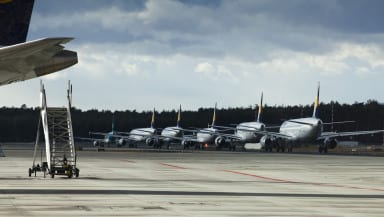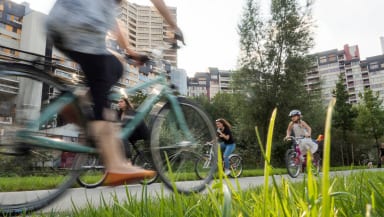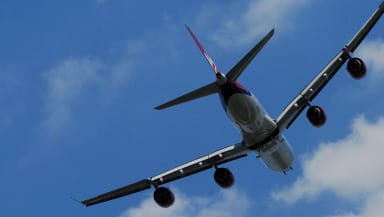During one of the biggest health and economic crises of our time, airlines and other polluting companies are demanding huge government bailouts. They want taxpayers’ money – our money – to keep them going.
Billionaire Richard Branson hasn’t paid UK tax for 14 years but he’s asking for a £500 million taxpayer bailout for his airline – Virgin Atlantic. Meanwhile, EasyJet is set to receive £600 million in government loans – while refusing to cancel a £170 million payout made to shareholders just weeks ago.
And here’s the thing: they want the money with no-strings-attached. No promises to clean up their businesses or protect the climate. No commitments to put their employees before shareholders and bonuses.
But here’s not much public support for blank-cheques airline bailouts. A recent Greenpeace / YouGov poll found that 93% of people don’t think that the airline industry should be a priority for government support.
That’s why we’ve written an open letter to the UK Chancellor Rishi Sunak. It says that if he gives airlines a bailout, they must protect workers, and cut their emissions by reducing flights. You can see the letter below.
The airline industry needs to change
For years, the airline industry has been able to operate on their own terms. They’ve avoided paying their fair share of taxes and dodged responsibility for their climate-wrecking emissions.
Just last year, for example, EasyJet was lobbying against green taxes that reflect some of the climate damage caused by their flights.
Meanwhile, industry documents reveal that even amid the health crisis, airlines planned an “aggressive global campaign” for tax breaks (including cutting green taxes), and to only offer vouchers for passengers with cancelled flights, rather than proper refunds.
This crisis has exposed the fragile foundations of our economy. It’s also shown how corporations like this will always act in their own interests. It’s clear that there’s a dire need to build a better future for the planet and all its people.
To do that, the airline industry needs to change, but as they’ve repeatedly shown, they won’t do the right thing unless they’re forced to – and that power lies with the government.
Tell the government: no airline bailouts unless the industry cleans up its act
So, the Chancellor has a decision to make. He can allow the airlines to go back to destructive business as usual. Or he can use this moment to make the industry start doing the right thing.
The government needs to make sure we have fewer flights, and affordable greener alternatives to flying (like trains!).
The good news is, there’s a fair and effective way to do this that’s pretty much ready to go. By introducing a Frequent Flyer Levy, the government could massively reduce the total number of flights without stopping ordinary people taking their holidays. Rather than taxing all flights the same, everyone would get one tax-free flight a year. Meanwhile, the tiny minority of ultra-frequent flyers (who take 70% of all UK flights) pay much more.
The current health crisis has turned many people’s lives upside down, including those in the airline industry. They’re worried about their health, job security and livelihoods. That’s why it is so important that the government makes sure that any public money goes to the right place and helps us build a better future for everyone.
Greenpeace shared this open letter with chancellor Rishi Sunak, signed by thousands of supporters.
—
Dear Chancellor,
Throughout the global Covid-19 health crisis, the aviation industry has lobbied the Treasury for vast sums of public money in the form of bailouts or ‘no-strings-attached’ loans.
As you are the main decision maker for how taxpayer money is used, we are writing to let you know how important it is that any public support offered to the aviation industry ensures workers and our planet are put first.
In addition to being one of the most polluting industries in the world, avoiding emission cuts as effectively as they avoid tax, airlines such as EasyJet refused to cancel big payouts to their shareholders in March, while they were asking their workers to go on unpaid leave. This is not an industry that will do the right thing voluntarily.
That’s why any government support must come with strict conditions, including:
Protect workers. Workers’ rights, pay and representation should be the priority, not profits for shareholders or bosses.
Protect the climate. Government must reduce the number of flights to tackle the sector’s climate impact without relying on offsetting.
Protect the public. The industry has to start paying a fair share of tax, including a Frequent Flyer Levy and make sure those who fly the most pay the most.
Now more than ever, public money must be used for public good – anything less won’t fly.



